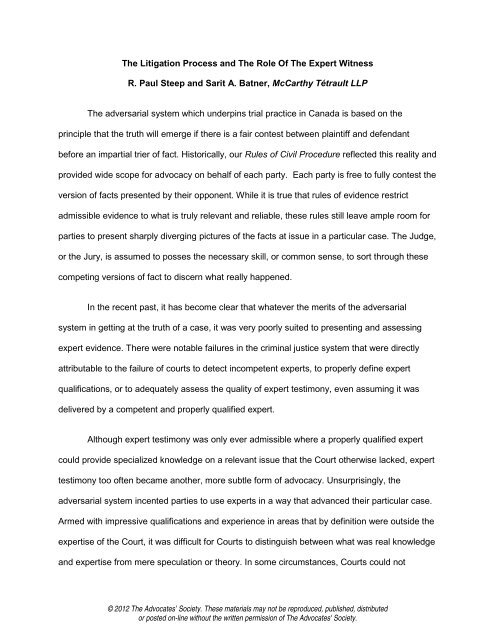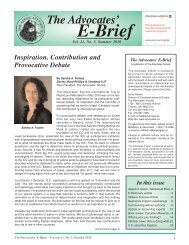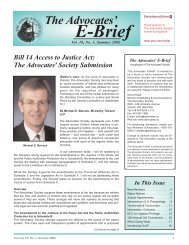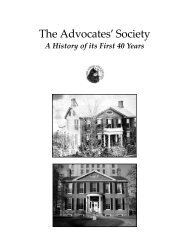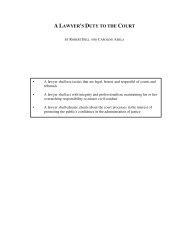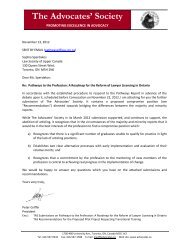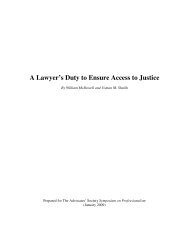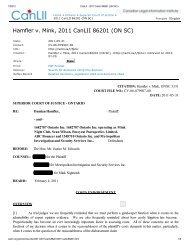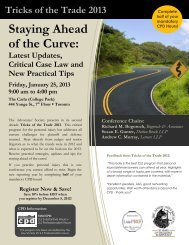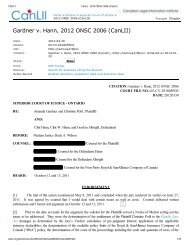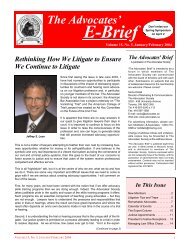Litigation Process a.. - The Advocates' Society
Litigation Process a.. - The Advocates' Society
Litigation Process a.. - The Advocates' Society
You also want an ePaper? Increase the reach of your titles
YUMPU automatically turns print PDFs into web optimized ePapers that Google loves.
<strong>The</strong> <strong>Litigation</strong> <strong>Process</strong> and <strong>The</strong> Role Of <strong>The</strong> Expert Witness<br />
R. Paul Steep and Sarit A. Batner, McCarthy Tétrault LLP<br />
<strong>The</strong> adversarial system which underpins trial practice in Canada is based on the<br />
principle that the truth will emerge if there is a fair contest between plaintiff and defendant<br />
before an impartial trier of fact. Historically, our Rules of Civil Procedure reflected this reality and<br />
provided wide scope for advocacy on behalf of each party. Each party is free to fully contest the<br />
version of facts presented by their opponent. While it is true that rules of evidence restrict<br />
admissible evidence to what is truly relevant and reliable, these rules still leave ample room for<br />
parties to present sharply diverging pictures of the facts at issue in a particular case. <strong>The</strong> Judge,<br />
or the Jury, is assumed to posses the necessary skill, or common sense, to sort through these<br />
competing versions of fact to discern what really happened.<br />
In the recent past, it has become clear that whatever the merits of the adversarial<br />
system in getting at the truth of a case, it was very poorly suited to presenting and assessing<br />
expert evidence. <strong>The</strong>re were notable failures in the criminal justice system that were directly<br />
attributable to the failure of courts to detect incompetent experts, to properly define expert<br />
qualifications, or to adequately assess the quality of expert testimony, even assuming it was<br />
delivered by a competent and properly qualified expert.<br />
Although expert testimony was only ever admissible where a properly qualified expert<br />
could provide specialized knowledge on a relevant issue that the Court otherwise lacked, expert<br />
testimony too often became another, more subtle form of advocacy. Unsurprisingly, the<br />
adversarial system incented parties to use experts in a way that advanced their particular case.<br />
Armed with impressive qualifications and experience in areas that by definition were outside the<br />
expertise of the Court, it was difficult for Courts to distinguish between what was real knowledge<br />
and expertise from mere speculation or theory. In some circumstances, Courts could not<br />
© 2012 <strong>The</strong> Advocates’ <strong>Society</strong>. <strong>The</strong>se materials may not be reproduced, published, distributed<br />
or posted on-line without the written permission of <strong>The</strong> <strong>Advocates'</strong> <strong>Society</strong>.
- 2 -<br />
distinguish between expert opinions that were demonstrably right from those that were actually<br />
wrong.<br />
Over the past 30 years, the use of experts in our Courts became more prevalent. <strong>The</strong>y<br />
also covered more diverse academic disciplines than ever before. So Courts were called upon<br />
to assess qualifications and testimony very far afield from traditional areas of expert testimony,<br />
like medicine, or engineering. <strong>The</strong> result was that experts were often permitted to testify even<br />
when the Court had genuine doubts about the qualifications of the expert, the reliability of the<br />
testimony, or it’s utility. <strong>The</strong>re was a tendency to allow the evidence in on the assumption that it<br />
can be dealt with on cross examination or assessed as to weight at a later stage of the trial. 1<br />
However this was a false hope. Expert testimony admitted in this fashion often confused, rather<br />
than clarified, the fact finding mission of the Court. <strong>The</strong> Court of Appeal has recently pointed out<br />
the pitfalls of such an approach.<br />
“Apart from trial economy, trial judges who fail to properly perform<br />
their gatekeeper function run the risk of having their decisionmaking<br />
function usurped or severely eroded by “expert<br />
generalists” who profess to know something about everything and<br />
who are only too willing to provide the court with a ready-made<br />
solution for any contentious issue that might exist. <strong>The</strong> problem<br />
with such witnesses is that while they appear knowledgeable and<br />
generally come across well, upon closer scrutiny, their opinions<br />
may well turn out to be little more than concoctions consisting of<br />
guesswork, speculation, commonplace information and junk<br />
science, with a hint of valid science thrown in for good measure.”<br />
Looking back we can see that these gatekeeping failures occurred despite the fact that<br />
the common law permitting the admission of expert testimony always clearly required such<br />
testimony to be, properly qualified, independent and necessary to assist the Court. But there are<br />
1 Johnson v. Milton (Town), 2008 ONCA 440 (CanLII)<br />
© 2012 <strong>The</strong> Advocates’ <strong>Society</strong>. <strong>The</strong>se materials may not be reproduced, published, distributed<br />
or posted on-line without the written permission of <strong>The</strong> <strong>Advocates'</strong> <strong>Society</strong>.
- 3 -<br />
disturbing examples of experts who apparently did not understand their role, believing that they<br />
were actually engaged to support a particular side rather than to assist the Court. 2<br />
“Dr. Smith, for example, claimed to have had little understanding<br />
of his role in court. He told the Goudge Inquiry that “[i]n the very<br />
beginning, when I went to court on the few occasions in the<br />
1980's, I honestly believed it was my role to support the Crown<br />
Attorney. I was there to make a case look good. That’s the way I<br />
felt.”<br />
<strong>The</strong> Rules of Civil Procedure now impose on experts a direct duty to the Court. Rule<br />
4.01 imposes a duty to:<br />
(a)<br />
(b)<br />
(c)<br />
provide opinion evidence that is fair, objective and non-partisan;<br />
opinion evidence that is only within the expert’s area of expertise, and<br />
other assistance that is reasonably necessary.<br />
<strong>The</strong>se duties prevail over any other obligation that the expert may owe to the party who retained<br />
him or her. So a properly qualified, and instructed, expert should self police with respect to the<br />
opinion he or she renders, before the evidence is ever tendered to a Court.<br />
However the Court’s gatekeeper function is still important. Courts are now armed with<br />
some additional tools to assist them in assessing expert testimony. Expert reports are<br />
essentially standardized. Experts are required to disclose their instructions and the factual<br />
assumptions, and documents 3 , upon which the report is based. Where a range of opinion might<br />
be acceptable, the expert must disclose where in that range his or her own opinion is situated.<br />
All of this is designed to provide transparency and to focus the expert’s attention on the fact that<br />
he or she is performing an independent role where their primary duty is to inform the Court with<br />
respect to some special knowledge they have, but the Court does not.<br />
2 <strong>The</strong> Changing Role of the Expert Witness, <strong>The</strong> Hon. Ian Binnie, Supreme Court Law Review, (2010) 49 S.C.L.R.<br />
(2d)<br />
3 Rule 53.03 (2.1)<br />
© 2012 <strong>The</strong> Advocates’ <strong>Society</strong>. <strong>The</strong>se materials may not be reproduced, published, distributed<br />
or posted on-line without the written permission of <strong>The</strong> <strong>Advocates'</strong> <strong>Society</strong>.
- 4 -<br />
<strong>The</strong> key to developing useful and admissible expert testimony is twofold; true<br />
qualifications and true independence. After the Goudge Inquiry, there is a heightened<br />
awareness of the need to be vigilant in assessing these criteria. Neither one is more important<br />
than the other. Both are essential and counsel must be confident that their chosen expert can<br />
withstand a searching inquiry on each. This includes the extent to which counsel has been<br />
involved in instructing the expert and in the preparation of the report. Counsel’s instructions are<br />
producible and counsel should conduct themselves accordingly. No court is likely to believe that<br />
counsel was completely uninvolved in reviewing drafts and providing comments, though many<br />
advocate this approach. This is a counsel of perfection that is likely to be observed in the<br />
breach. But counsel, like the expert, can police themselves and ensure that any commentary, is<br />
fair and objective and does not lead the expert into any area of advocacy. Any involvement of<br />
counsel must be able to withstand the scrutiny of the trial judge.<br />
For an expert to truly understand his or her role in the trial process would require a legal<br />
education. But there are some basic concepts that are easily summarized which will assist<br />
experts, especially those who have not testified before, in understanding some of the more<br />
technical aspects of giving expert testimony.<br />
<strong>The</strong> Admissibility of Expert Evidence at Trial<br />
Expert evidence may be tendered at trial as an exception to the rule against hearsay<br />
evidence that confines witnesses to testifying as to matters of fact as opposed to matters of<br />
opinion. <strong>The</strong> rationale for the exception to the hearsay rule allowing experts to tender opinion<br />
evidence was articulated by Dickson J. in R v. Abbey.<br />
With respect to matters calling for special knowledge, an expert in<br />
the field may draw inferences and state his opinion. An expert’s<br />
function is precisely this: to provide the judge and jury with a<br />
ready-made inference which the judge and jury, due to the<br />
technical nature of the facts, are unable to formulate. An expert’s<br />
opinion is admissible to furnish the Court with scientific information<br />
© 2012 <strong>The</strong> Advocates’ <strong>Society</strong>. <strong>The</strong>se materials may not be reproduced, published, distributed<br />
or posted on-line without the written permission of <strong>The</strong> <strong>Advocates'</strong> <strong>Society</strong>.
- 5 -<br />
which is likely to be outside the experience and knowledge of a<br />
judge or jury. If on the proven facts a judge or jury can form their<br />
own conclusion without help, then the opinion of the expert is<br />
unnecessary. 4<br />
It is therefore only in those cases where the issues to be determined are beyond the scope of<br />
the knowledge expected of laymen that expert evidence will be admissible. <strong>The</strong> test for the<br />
admissibility of expert evidence was subsequently elaborated upon and refined in R v. Mohan 5 .<br />
<strong>The</strong> following four criteria must be met before expert evidence will be admitted at trial:<br />
(i)<br />
(ii)<br />
(iii)<br />
relevance;<br />
necessity;<br />
the absence of an exclusionary rule; and<br />
(iv) a properly qualified expert. 6<br />
i) Relevance<br />
To be relevant, expert evidence must be logically probative of a fact in issue. However,<br />
even if the expert evidence is relevant, the trial judge has the discretion to exclude such<br />
evidence where the prejudicial effect of admitting it would outweigh its probative value. 7<br />
When<br />
deciding whether to retain an expert to tender evidence, the trial lawyer should consider whether<br />
the time required to present such evidence would be inordinate in comparison to its evidential<br />
value 8 and, if in the context of a jury trial, whether such evidence is likely to confuse, mislead or<br />
overwhelm the jury. 9<br />
<strong>The</strong> court is more likely to admit expert evidence where doing so will not<br />
4 R v. Abbey (1982), 138 D.L.R. (3d) 202 at 217. More recently, in R v. D. (D.), [2002] 2 S.C.R. 275, the Supreme<br />
Court of Canada has upheld the cite (?)<br />
5 [1994] 2 S.C.R. 9 [Mohan].<br />
6 Ibid at p. 20.<br />
7 Ibid at p.21.<br />
8 J. Sopinka, S.N. Lederman and A.W. Bryant, <strong>The</strong> Law of Evidence in Canada, 2 nd Ed. (Toronto: Butterworths, 1999)<br />
at § 12.34.<br />
9 Ibid.<br />
© 2012 <strong>The</strong> Advocates’ <strong>Society</strong>. <strong>The</strong>se materials may not be reproduced, published, distributed<br />
or posted on-line without the written permission of <strong>The</strong> <strong>Advocates'</strong> <strong>Society</strong>.
- 6 -<br />
confound the trier of fact, unduly complicate the issues, or run the risk of “mystifying” the trier of<br />
fact to the extent that the ability to remain objective is compromised. 10<br />
ii)<br />
Necessity<br />
To meet the requirement of necessity, expert evidence tendered at trial must be deemed<br />
to be “necessary in the sense that it provides information that is likely to be outside the<br />
experience or knowledge of a judge or jury”. 11<br />
In R. D. (D.) 12 the Supreme Court stated that<br />
expert evidence will be deemed necessary in those exceptional cases where the trier of fact is<br />
unable to reach its own conclusion in the absence of assistance from experts with special<br />
knowledge. 13 <strong>The</strong> courts have excluded expert evidence on the basis that an understanding of<br />
concepts and principles underlying the action did not require expert assistance and where there<br />
existed no specialized and standardized body of conduct to study in the area. 14 Moreover,<br />
where the issue for which expert evidence is sought to be tendered amounts to an opinion on a<br />
legal issue, the courts will not permit the expert to usurp the function of the court. 15 It is<br />
important to bear in mind the “ultimate issue rule”. This rule stipulates that a court cannot admit<br />
evidence which purports to answer the very question which the trier of fact must resolve for<br />
itself. In professional liability cases, therefore, it is never appropriate to ask the expert whether<br />
in her opinion, the defendant was negligent, as this is a finding reserved to the trier of fact.<br />
Rather, the expert should be asked to opine as to the applicable standard of care and whether,<br />
in the particular case, the defendant met that standard.<br />
10 Mohan, supra at note 3, p. 21; Sopinka et. al., supra at note 6, p. 620; R v. Melangri (1992), 73 C.C.C. (3d) 348<br />
(Ont. Gen Div.)<br />
11 Ibid, Mohan at p. 24.<br />
12 [2002] 2 S.C.R. 275.<br />
13 Also see Mayfield v. Mayfield (2001), 18 R.F.L. (5 th ) 328 (Ont. Sup. Ct.) where the court concluded that where it is<br />
not shown that expert evidence is necessary in the sense described above, it will not be admitted as expert<br />
evidence is costly and time consuming.<br />
14 Pente Investment Management Ltd. v. Schneider Corp., [1998] O.J. No. 6387 (Ont. Gen. Div.); the court refused to<br />
admit evidence as to the standard to be applied to the performance of the Board of Directors.<br />
15 Ibid.<br />
© 2012 <strong>The</strong> Advocates’ <strong>Society</strong>. <strong>The</strong>se materials may not be reproduced, published, distributed<br />
or posted on-line without the written permission of <strong>The</strong> <strong>Advocates'</strong> <strong>Society</strong>.
- 7 -<br />
<strong>The</strong>re are particular types of actions where expert evidence will always be necessary to<br />
prove essential elements of the case. For example, in a medical malpractice action, the plaintiff<br />
must essentially always tender expert evidence that is capable of supporting the conclusion<br />
that the defendant physician failed to meet the standard of care, as such matters are by their<br />
very nature beyond the knowledge of the trier of fact. In a medical malpractice case, failure to,<br />
or undue delay in, filing a medical expert report supporting the allegations related to negligence<br />
and/or causation may result in summary judgment against the plaintiff. 16<br />
iii)<br />
Absence of any Exclusionary Rule<br />
Other than the rule against hearsay, expert opinion evidence is subject to the ordinary<br />
rules governing the admissibility of evidence. 17<br />
<strong>The</strong> fundamental determination that underlies<br />
all exclusionary rules is whether the prejudicial effect of the evidence outweighs its probative<br />
value. It has been stated that “the exclusionary rules likely to be relevant at this stage of the<br />
analysis are rules that are particular to specific types of evidence” such as the inadmissibility of<br />
a polygraph test result. 18<br />
iv)<br />
Properly Qualified Expert<br />
In order for the evidence of an expert to be admissible, the expert must be shown to be<br />
properly qualified by demonstrating that he or she has acquired special or peculiar knowledge<br />
through study or experience in respect of the matters on which he or she intends to testify. 19<br />
It<br />
is imperative to challenge the admissibility of an expert’s evidence on the basis of insufficient<br />
qualifications directly after that expert has recited his qualifications to the court and before his<br />
16 Claus v. Wolfman (1999), 52 O.R. (3d) 673 (Ont. Sup. Ct.), aff’d. (2000) 52 O.R. (3d) 680 (C.A.); Ngo v. Toronto<br />
Western Hospital, [1994] O.J. No. 250, (Ont. Gen. Div.).<br />
17 Niels Ortved, “ <strong>The</strong> Trial Judge as Gatekeeper: A New Level of Scrutiny for the Introduction of Expert Opinion<br />
Evidence”, Internal Memorandum, McCarthy Tétrault, LLP (May, 1998)[Ortved].<br />
18 Mark J Freiman and Mark L. Berenblut, <strong>The</strong> Litigator’s Guide to Expert Witnesses, ( Aurora: Canada Law Book,<br />
1997) at 11. As the authors explain, the results of a polygraph test, and the testimony of the person who<br />
administered it, may arguably be necessary and reliable, however, they are “inadmissible because it infringes<br />
the common law rule against he admissibility of evidence presented exclusively to affirm the truthfulness of<br />
another witness”. [Freiman and Berenblut]<br />
19 Mohan, supra at p. 25; Ortved, supra at p. 10; Freiman and Berenblut supra at p. 12.<br />
© 2012 <strong>The</strong> Advocates’ <strong>Society</strong>. <strong>The</strong>se materials may not be reproduced, published, distributed<br />
or posted on-line without the written permission of <strong>The</strong> <strong>Advocates'</strong> <strong>Society</strong>.
- 8 -<br />
substantive testimony is given. If counsel wishing to object on this basis waits until after the<br />
substantive testimony is underway, any lack of qualification, regardless of its extent, will only go<br />
to weight as opposed to admissibility. 20 It is also important to carefully assess the precise area<br />
in which the expert is asking permission to testify. For example, it is important in cases where<br />
the expert is retained to tender evidence with respect to the standard of care in a professional<br />
liability case that the expert be qualified in the same field as that of the defendant.<br />
Qualifications of the Expert<br />
Technical expertise of the expert in the relevant field is essential. It is prudent to seek an<br />
expert who possesses the right balance of education, training and experience. 21<br />
Although an<br />
expert may be highly educated and published, lack of experience in the relevant field may affect<br />
the weight that will be given to his evidence in some cases, particularly those where the issue to<br />
which the expert is testifying is the standard of care in professional liability cases. In such cases,<br />
it is expected that the expert testifying as to the requisite standard of care will be a member of<br />
the defendant’s community of the same experience as the defendant who is able to appreciate<br />
all of the circumstances of the particular case. It is best in professional liability cases to retain an<br />
expert with practical experience comparable to that of the defendant. In other cases, however,<br />
where an expert may be required to tender evidence as to economic or sociological trends, a<br />
highly academic background which an established record of peer reviewed research may be<br />
preferable. It is always prudent to consider the source of the expertise and its practical<br />
relevance to the issues at hand.<br />
It is advisable to retain an expert with some previous experience in a courtroom setting.<br />
<strong>The</strong> expert will then know what to expect of examination-in-chief and cross-examination and will<br />
20 “Effective Use of Expert Evidence”, <strong>The</strong> Advocate’s <strong>Society</strong> London 1996 Courthouse Series, February 1, 1996,<br />
pp. 25-7.<br />
21 Otoway B. Denny Jr. “How to Select an en Expert Witness”, Expert Testimony and the Defence of <strong>Litigation</strong>,<br />
Donald J, Hirsch Ed., (Chicago: <strong>The</strong> Defence Research Institute Inc., 1990).<br />
© 2012 <strong>The</strong> Advocates’ <strong>Society</strong>. <strong>The</strong>se materials may not be reproduced, published, distributed<br />
or posted on-line without the written permission of <strong>The</strong> <strong>Advocates'</strong> <strong>Society</strong>.
- 9 -<br />
have gotten over any nerves borne of inexperience. Be especially cautious, however, to avoid<br />
experts who have gained a reputation as a “professional witness”. It is prudent to enquire into<br />
the percentage of the expert’s income comprised of expert witness fees. Although the expert<br />
may not wish to divulge such information, asking experienced colleagues and other persons<br />
practicing in the same field as the potential expert will likely provide a good indication of the<br />
expert’s courtroom experience. It may be inadvisable to retain an expert whose past experience<br />
has been confined solely to testifying for plaintiffs or defendants. <strong>The</strong>y can appear biased from<br />
the outset. If the expert has a reputation for being “plaintiff oriented” for example, opposing<br />
counsel who have researched that record and may be in a position to object to the expert’s<br />
evidence on the basis of bias. Although it may not be likely that the expert’s evidence will be<br />
ruled inadmissible, the appearance of such bias or favourable disposition to one party may<br />
affect the weight that will be given to his evidence, since it places the objectivity of such<br />
evidence into question.<br />
Assisting <strong>The</strong> Expert in Being An Effective Courtroom Witness<br />
Experts must be qualified and independent, but it is helpful, if not essential, that they<br />
also have effective communication skills. Effective communication skills on the part of an expert<br />
are important throughout the litigation process, especially at the following three stages:<br />
• when educating counsel prior to trial<br />
• when educating the fact-finder during trial; and,<br />
• during cross-examination. 22<br />
<strong>The</strong> most highly qualified expert will be of little value if that expert lacks the ability to effectively<br />
communicate her opinion in a precise, clear and cogent manner:<br />
22 James H. Seckinger, “Presenting Expert Testimony” Canadian Bar Association Conference, May 1 and 2, 1992,<br />
Advocacy ’92: <strong>The</strong> Changing Role of the Expert Witness at 39 [Seckinger]; Morrison and Bryant, supra at p.5.<br />
© 2012 <strong>The</strong> Advocates’ <strong>Society</strong>. <strong>The</strong>se materials may not be reproduced, published, distributed<br />
or posted on-line without the written permission of <strong>The</strong> <strong>Advocates'</strong> <strong>Society</strong>.
- 10 -<br />
Although the independence, integrity and strength of the expert’s<br />
opinion is critical, the value of the opinion is diminished if it cannot<br />
be effectively communicated to the fact-finder at trial”. 23<br />
<strong>The</strong> issue upon which experts are retained to opine are usually complex and often times<br />
technical. It is advisable to remind your expert that the concepts and terminology that are<br />
familiar to him will not be familiar to the trier of fact, and it is best to use plain language and<br />
break down complex and technical concepts into simplified parts.<br />
When preparing an expert for trial, work with the expert to ensure that her testimony is<br />
presented in a sequence with which he or she feels most comfortable. Doing so helps to ensure<br />
that the expert does not become flustered or forget an important point. Although counsel is likely<br />
to catch any missed points, it is often most effective when the information appears to come<br />
naturally as opposed to being coaxed by counsel. Moreover, as with any other witness, the<br />
testimony of the expert will appear more confident if the expert is in his ‘comfort zone’ and this<br />
will affect how credible the expert is perceived to be. During pre-trial preparation of the expert,<br />
ensure that any weaknesses in the expert’s opinion are put to him so that he will not be taken by<br />
surprise by opposing counsel once he is ‘in the box’.<br />
Some tips to ensure that your expert is able to effectively communicate his opinion to the<br />
fact-finder include:<br />
• ensuring that the expert makes eye contact with the trier of fact<br />
rather than the lawyer when giving evidence;<br />
• instructing the expert to use clear, concise and plain language<br />
when discussing complex and technical concepts;<br />
• avoid jargon familiar to the expert and his or her peers but not to the<br />
Court<br />
• having the expert give viva voce evidence in a conversational<br />
manner;<br />
23 Ibid [Seckinger] at 39.<br />
© 2012 <strong>The</strong> Advocates’ <strong>Society</strong>. <strong>The</strong>se materials may not be reproduced, published, distributed<br />
or posted on-line without the written permission of <strong>The</strong> <strong>Advocates'</strong> <strong>Society</strong>.
- 11 -<br />
• allowing the expert to present his evidence in a sequence that is<br />
most comfortable for him; and<br />
• having demonstrative evidence available to the expert. 24<br />
During the pre-trial preparation stage of the action, the expert should be apprised of all the<br />
relevant facts and issues of the case, whether helpful or harmful and whether or not they are<br />
pertinent to his particular evidence. Fully informing your expert of all the relevant facts and<br />
issues will safeguard against the expert being taken by surprise or inadvertently appearing to<br />
lack independence because he avoided unpleasant facts.<br />
<strong>The</strong> Objective and Independent Expert<br />
<strong>The</strong> opinion of an expert who lacks independence and objectivity, whether actual or<br />
perceived, will likely be given little weight and in some cases, may be ruled inadmissible. As<br />
noted above, an expert with a reputation amongst lawyers and her peers as always testifying to<br />
one side or another may be perceived as biased to one party over the other and this lack of<br />
objectivity may affect the weight to be given to her testimony. In the pre-trial preparation stages<br />
of the litigation, the expert must conduct an independent examination of the issues at hand. 25<br />
While it may be acceptable for the lawyer to explain the theory of the case that he or she will<br />
pursue, it is ultimately the job of the expert to objectively assess the facts that underlie that<br />
theory and come to his own conclusions based on the available information.<br />
It goes without saying that counsel will seek out an expert that<br />
supports the theory of the client’s case. However, even the<br />
strongest endorsement by an expert of a theory that helps the<br />
client’s case will be wasted if the expert appears to be nothing but<br />
a “gun for hire” – willing to say anything he is paid to say. To that<br />
end, it is important to ensure that there are no personal<br />
circumstances that would render the retainer of the expert<br />
24 <strong>The</strong> use of demonstrative evidence is discussed further below.<br />
25 Morrison and Bryant, supra note 19 at p. 5. Appendix A contains a list of databases which may be helpful in<br />
locating experts.<br />
© 2012 <strong>The</strong> Advocates’ <strong>Society</strong>. <strong>The</strong>se materials may not be reproduced, published, distributed<br />
or posted on-line without the written permission of <strong>The</strong> <strong>Advocates'</strong> <strong>Society</strong>.
- 12 -<br />
inadvisable, such as the expert having a stake in the client’s<br />
business, or demanding an exorbitant fee to appear. 26<br />
When determining the appropriateness of retaining a particular expert, the lawyer should<br />
enquire into the expert’s background, associations and memberships. <strong>The</strong> duty of the expert is<br />
to assist the court in its truth finding function and an expert who lacks the requisite objectivity<br />
and impartiality will jeopardize this mandate and imperil his own professional reputation. It is<br />
essential when retaining an expert that the lawyer be aware of the expert’s duties as set down in<br />
Rule 4.01.<br />
Expert evidence has been ruled inadmissible on the basis of bias where the expert<br />
retained has been deeply involved in the litigious matter for a prolonged period of time and has<br />
through this involvement become an ‘advocate’ for the party by which he has been retained. 27<br />
Exorbitant retainer and contingency fees have been found to preclude the expert from being<br />
neutral and objective. 28 Actual bias is not necessary when the independence and objectivity of<br />
the expert is being challenged; the appearance of bias will suffice to affect the weight or<br />
admissibility of expert evidence. Regardless of how unbiased the expert’s conclusions are,<br />
where a reasonable person, informed of the relevant facts might think that the circumstances<br />
may be capable of affecting the expert’s views, the evidence ought not to be admitted. 29<br />
Properly Qualifying Your Expert<br />
Introducing your expert witness to the court is not simply a technical formality. Rather, it<br />
is the key to safeguarding the expert evidence against any challenges by opposing counsel<br />
based on lack of, or insufficient, qualifications. Simply launching directly into the substantive<br />
26 Wright, supra note 1 at p. 237.<br />
27 Ibid.<br />
28 Bank of Montreal v. Citak, [2001] O.J. No. 1096; See also Brampton Vee World Motors Ltd. v. R (2004), 2004<br />
CarswellNat 4951; Schreiber v. R. (2004), 2004 2069, (sub nom. R v. Eurocopter Canada Ltd.) 185 C.C.C. (3d)<br />
233 (S.C.J.) past relationships do not necessarily act as a complete bar to the expert evidence, but may affect<br />
the weight<br />
29 Liverpool Roman Catholic Archdiocese Trustees v. Goldberg (No. 2), [2001] 4 All E.R. 951; “Expert Essentials”<br />
Conference of the Advocates <strong>Society</strong> (CLE), (February 15, 2005).<br />
© 2012 <strong>The</strong> Advocates’ <strong>Society</strong>. <strong>The</strong>se materials may not be reproduced, published, distributed<br />
or posted on-line without the written permission of <strong>The</strong> <strong>Advocates'</strong> <strong>Society</strong>.
- 13 -<br />
evidence of the expert will provide opposing counsel the opportunity to challenge the<br />
admissibility of the evidence on the basis that no foundation for the expert’s opinion has been<br />
established. An inadequate introduction of the expert may limit the weight given to the expert<br />
evidence. For example, merely introducing an expert as an “accountant” will likely be deficient to<br />
demonstrate the requisite expertise required to render an opinion on complex actuarial issues. 30<br />
It is highly advisable that the expert be qualified in all areas for which the expert will be<br />
rendering her opinion.<br />
It is advisable to have thoroughly reviewed the expert’s curriculum vitae with the expert<br />
prior to trial and to identify any publications, speeches, and practical experiences that are<br />
directly relevant to the issues to which the expert will be opining. <strong>The</strong> following framework for<br />
qualifying the expert is a useful guide: 31<br />
(a)<br />
identify the expert’s training and experience applicable to the expert’s evidence<br />
(either by asking direct questions or guiding the expert through his curriculum vitae)<br />
making sure to highlight all relevant:<br />
(i)<br />
(ii)<br />
(iii)<br />
(iv)<br />
(v)<br />
(vi)<br />
(vii)<br />
academic credentials;<br />
posts, if any, which the expert holds;<br />
academic and practical experience;<br />
positions in professional organizations and on committees;<br />
executive positions held within the profession;<br />
professional recognition and honours;<br />
publications written by the expert pertaining to the particular field of<br />
expertise, giving the dates and names of the publisher or publication in<br />
which they appear; and<br />
30 “Dealing with Experts in the Box” a demonstration prepared by Justice Stephan Goudge (Ont. C.A.), Michael<br />
Barrack (McCarthy Tétrault LLP), Ron Dimock (Dimock, Stratoon, Clarizio LLP) and Bob Martin<br />
(Pricewaterhouse Cooper) for <strong>The</strong> Advocates <strong>Society</strong> CLE conference “Expert Essentials” (Toronto: February<br />
15, 2005)<br />
31 This list was developed out the Advocates <strong>Society</strong>’s 2004 “Expert Evidence” program chaired by Barry Leon (Torys<br />
LLP) and Bonnie A. Tough (Tough & Podrebarac LLP) with the assistance of Saro Sarmazian (student-at-law,<br />
Torys LLP).<br />
© 2012 <strong>The</strong> Advocates’ <strong>Society</strong>. <strong>The</strong>se materials may not be reproduced, published, distributed<br />
or posted on-line without the written permission of <strong>The</strong> <strong>Advocates'</strong> <strong>Society</strong>.
- 14 -<br />
(viii) appointments to lectureship. 32<br />
(b)<br />
(c)<br />
(d)<br />
(e)<br />
have the expert provide the contextual framework for the testimony (i.e.: a<br />
description of the investigation or examination that the expert was retained to do);<br />
relate the expert’s expertise to the issues in the case to which the expert will opine;<br />
permit the expert to discuss more fully the material aspects of his curriculum vitae<br />
and guide him through the less material parts; and<br />
advise the expert that modesty is not always a virtue-the expert should be confident<br />
to speak about his experiences and training.<br />
It is important to highlight the most relevant aspects of the expert’s curriculum vitae rather than<br />
canvassing every minute detail. At the time that the expert is qualified before the court, his<br />
curriculum vitae will be entered as an exhibit and the fact finder will have it at its disposal for<br />
reference if need be. <strong>The</strong> expert’s curriculum vitae should, therefore, contain all the information<br />
about the expert that is pertinent to his qualifications and the issues at hand.<br />
Even if offered the opportunity by opposing counsel, do not forego spending some time<br />
qualifying your expert. It is the first chance you have to introduce him to court, demonstrate his<br />
expertise, and get him comfortable on the stand.<br />
Conclusion<br />
An expert who understands the basic concepts concerning his or her role as an expert<br />
will be of true assistance to the Court. <strong>The</strong>y will not be misled by the adversarial process and<br />
will be able to focus on the task at hand; imparting specialized knowledge on a matter of<br />
relevance in an independent and unbiased manner.<br />
32 Freiman and Berenblut, supra note 16 at p. 37.<br />
© 2012 <strong>The</strong> Advocates’ <strong>Society</strong>. <strong>The</strong>se materials may not be reproduced, published, distributed<br />
or posted on-line without the written permission of <strong>The</strong> <strong>Advocates'</strong> <strong>Society</strong>.


